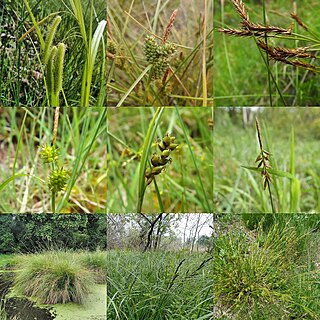
Carex is a vast genus of over 2,000 species of grass-like plants in the family Cyperaceae, commonly known as sedges. Other members of the family Cyperaceae are also called sedges, however those of genus Carex may be called true sedges, and it is the most species-rich genus in the family. The study of Carex is known as caricology.
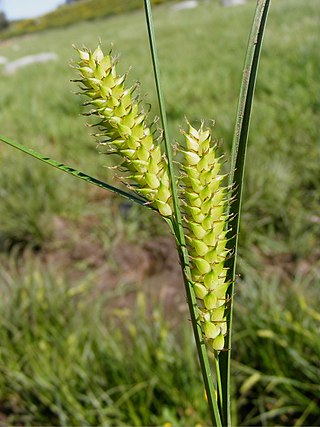
Carex vesicaria is an essentially Holarctic species of sedge known as bladder sedge, inflated sedge, and blister sedge. It has been used to insulate footwear in Norway and among the Sami people, and for basketry in North America.

Carex tumulicola, the splitawn sedgefoothill sedge, or previously Berkeley sedge, is a sedge member of the family Cyperaceae.
Carex vicinalis is a species of sedge that was first described by Francis Boott in 1867. It is native to southern India. The type specimen was collected at the Nilghiri Hills.

Carex siccata, common names including dryspike sedge, is a species of Carex native to North America. It is listed as endangered in New Jersey. As of May 2021, USDA Plants regards Carex foenea as a synonym of C. siccata, whereas the World Checklist of Selected Plant Families regards only two varieties of C. foenea as synonyms, treating C. foenea itself as a separate species.

Carex viridula, known as little green sedge, green sedge, or greenish sedge, is a small flowering plant native to North America, Europe, Asia, and Morocco.
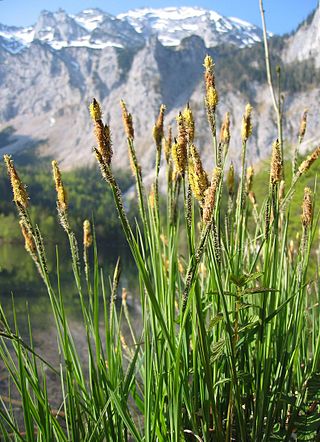
Carex elata, is a species of tussock-forming, grass-like plant in the Cyperaceae family. It is native to all of Europe, the Atlas Mountains of Africa, Turkey, Iran and Central Asia.
Carex microglochin, called the fewseeded bog sedge and bristle sedge, is a species of flowering plant in the genus Carex, native to temperate and subarctic North America, South America, Europe and Asia. It is uncertain which hemisphere it originated on before dispersing to the other.

Carex divulsa, the grey sedge, is a species of flowering plant in the genus Carex, native to Macaronesia, Europe, northwest Africa, the Caucasus region, and the Middle East as far east as Turkmenistan. It has been introduced to northeast Argentina, the District of Columbia and Pennsylvania in the United States, Ontario in Canada, the North Island of New Zealand, and Tasmania and Victoria in Australia. It is the namesake of the Carex divulsa aggregate.
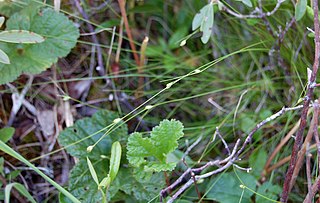
Carex trisperma, the three-seeded sedge, is a species of flowering plant in the genus Carex, native to Canada, Greenland, and the northeastern United States. It is typically found in acidic bogs within forests.

Carex tribuloides, the blunt broom sedge, is a species of flowering plant in the genus Carex, native to the eastern United States, eastern Canada, and Veracruz in Mexico, and introduced in Sweden. It is an important food for soras during their spring migration.
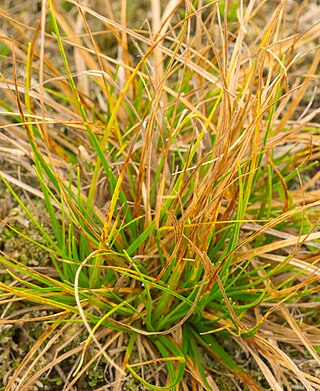
Carex umbellata, the parasol sedge, is a species of flowering plant in the genus Carex, native to Canada and the central and eastern US, and introduced to the Dominican Republic. Its seeds are dispersed by ants.

Carex communis, the fibrous-root sedge, is a species of flowering plant in the genus Carex, native to central and eastern Canada and the central and eastern United States. Its seeds are dispersed by ants.

Carex dolichostachya is a species of flowering plant in the sedge genus Carex, family Cyperaceae. It is native to eastern Asia; central and southeast China, Taiwan, the Philippines, Korea, the Ryukyu Islands, and Japan. Its popular cultivar 'Kaga-nishiki' is sold in the US by the trade designation Gold Fountains.

Carex flaccosperma, the blue wood sedge, is a species of flowering plant in the family Cyperaceae, native to the south-central and southeastern US. Preferring to grow in wet, shady situations and deer resistant, it is recommended for shady areas in rain gardens.

Carex frankii, also known as Frank's sedge, is a widespread species of flowering plant in the family Cyperaceae, native to temperate eastern North America; Ontario, the central and eastern United States, and Coahuila, Mexico. Preferring to grow in wet, shady situations such as the edges of streams and ponds, and erosion resistant, it is recommended for rain gardens.
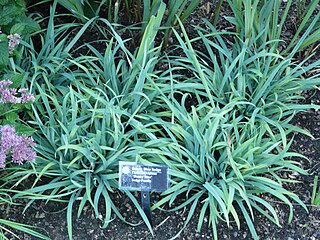
Carex laxiculmis, the creeping sedge, is a species of flowering plant in the family Cyperaceae, native to Ontario, Canada, and the central and eastern United States. As with most species of sedge, it prefers to grow in shady, wet areas. Its cultivar 'Hobb', sold under the trade designation Bunny Blue, is available from commercial nurseries.

Carex radiata, the eastern star sedge, is a species of flowering plant in the family Cyperaceae, native to central and eastern North America. It is cultivated for its yellowish-green foliage and its relatively—for a sedge—showy flowers.
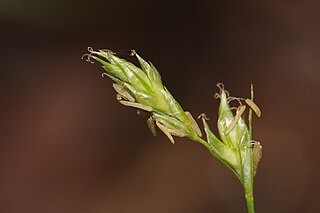
Carex deweyanaDewey's sedge, short-scale sedge, is a species of sedge native to Canada and the United States.

Castilleja haydenii, also known as Hayden's paintbrush, is a species of flower found in the mountains of southern Colorado and northern New Mexico, generally above timberline in the alpine tundra. Its purple flowers appear in the months of July through September. It was named after the geologist Ferdinand Vandeveer Hayden.




















